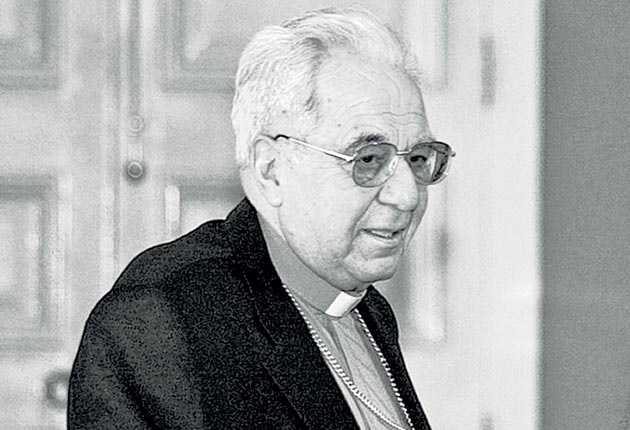Bishop Sergio Valech: Priest who helped lead the opposition to the Pinochet regime in Chile

Your support helps us to tell the story
From reproductive rights to climate change to Big Tech, The Independent is on the ground when the story is developing. Whether it's investigating the financials of Elon Musk's pro-Trump PAC or producing our latest documentary, 'The A Word', which shines a light on the American women fighting for reproductive rights, we know how important it is to parse out the facts from the messaging.
At such a critical moment in US history, we need reporters on the ground. Your donation allows us to keep sending journalists to speak to both sides of the story.
The Independent is trusted by Americans across the entire political spectrum. And unlike many other quality news outlets, we choose not to lock Americans out of our reporting and analysis with paywalls. We believe quality journalism should be available to everyone, paid for by those who can afford it.
Your support makes all the difference.Bishop Sergio Valech Aldunate was one of the most formidable opponents of the Western-backed terrorist regime of General Augusto Pinochet in Chile and a strong supporter of the cause of the Chilean poor.
The country's current president Sebastiá* Piñera, despite having had strong ideological links with Pinochet, immediately decreed two days' national mourning.
Valech's father was Antonio, a Levantine Christian who migrated to Chile early last century and made a fortune in property; Sergio always had money. He was ordained priest in 1953 by the influential figure of Cardinal José María Caro, archbishop of Santiago. He thus became part of a Chilean clergy who were – and still remain – in large part humble and dedicated, far removed from such as the Argentine and Colombian churches, who have for long hidden in their ranks men whose actions are scandalously unchristian and whose conduct has at times been blatantly fascist.
Valech was always a conscientious administrator, careful with money, and early on he caught the eye of Cardinal Raúl Silva, who had succeeded to the see of Santiago. Silva and his auxiliary, Fernando Ariztía, consecrated Valech a bishop a fortnight before Pinochet's bloody putsch of 11 September 1973. Silva, Ariztía and Valech formed a powerful episcopal defence force as the military regime captured, tortured and killed at will with no effective interference from Western governments, which continually and mendaciously proclaimed their adherence to democracy and human rights.
Valech was prominent in the Comité Pro Paz [Committee for Peace], set up by Silva as a multi-church committee which sought to aid the regime's victims, with Ariztía as its head. Its actions enfuriated Pinochet and his supporters in Washington, who by the mid-1970s had it closed down.
Herná* Montealegre, a lawyer friend of Archbishop Silva who was one of the Comité's leading figures, was arrested by the DINA, Pinochet's police, and locked in Tres Álamos, one of the capital's torture centres, on the ridiculous charge that he was a communist. This gave rise to one of the most symbolic church-regime confrontations, when Valech and Silva went to visit him in his cell. A guard stayed, as ordered, with the three to monitor their conversations. Silva and Valech waited for him to leave, and when he did not Silva himself went to leave while Valech demanded the guard get him a telephone with which to call the interior minister. The guard hesitated and finally left the prisoner and his two visitors alone.
Some months later Ariztía was exiled from Santiago to the northern diocese of Copiapó. Valech became one of the first leaders of the Vicariate of Solidarity, the successor to the Comité, and was given the task of forming its archive. The dictator made many attempts to seize these papers: on one occasion he sent General Fernando Torres, one of his closest henchmen, to Valech's office demanding to see all the records of a man accused of killing a carabinero, or policeman. Torres was turned away with a firm "no". Much later Valech and the general decided on a personal reconciliation.
The church's task was to a large extent blighted by the arrival in 1978, for a 10-year stay, of Angelo Sodano, papal nuncio to Chile (he was later to become Cardinal Secretary of State in the Vatican, the equivalent of prime minister). Making it his business to cultivate a relationship with the dictatorship, Sodano brought about Silva's retirement in 1983, shortly after his 75th birthday, the first opportunity the diplomat could seize. The regime had lost an opponent and Valech a constant support.
In 2000, after Pinochet's detention and disgrace in London and his return, much diminished, to Santiago, Valech was prominent in the discussions about human rights under the dictatorship and headed an official commission on political imprisonment and torture which had compensation paid to Pinochet's victims.
Valech retired from his bishopric in 2003 and devoted his own very substantial funds to good causes ofhis choice. He died in a retirement home in Santiago of pulmonary cancer rooted in his life-long addiction to cigarettes.
Sergio Valech Aldunate, priest: born Santiago 21 October 1927; died Santiago 24 November 2010.
Join our commenting forum
Join thought-provoking conversations, follow other Independent readers and see their replies
Comments